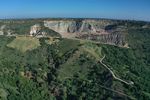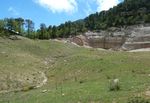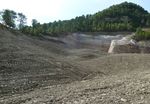Geomorphic Reclamation Study trip - From the real Lappland to the Spanish Lappland - in search of geomorphic-based mine restorations - Life Ribermine
←
→
Page content transcription
If your browser does not render page correctly, please read the page content below
October 2021
20th — 22nd
Geomorphic Reclamation
Study trip
From the real Lappland to the Spanish Lappland –
in search of geomorphic-based mine restorations
GEOMORPHIC PRINCIPLES are being integrated into waste rock dump designs to create landforms with significant benefits
compared to conventional waste rock dump design. In this 3-day study trip to Spain we visit built and under construction
geomorphic reclamation sites to investigate and discuss the possibilities of transferring this knowledge to a Swedish context.
While the climate is different, the geomorphic principles to be adopted are universal. During the trip you will be guided
through an in-depth look into the successes and failures of geomorphic reclamation in Spain including developing a greater
understanding of geomorphic design method.
What is Geomorphic Design? Why Geomorphic Design?
Geomorphic waste rock dump design
‘Geomorphic reclamation asks: is being implemented and proven
“What would be a stable, natural landform?” worldwide. It includes the
and then designs and builds that’. following benefits:
• Long term stable landform
Geomorphic reclamation mimics the local • Stability against surface erosion
geomorphology of a landscape to create a • Function & visual integration with the
landform that would have occurred naturally in surrounding landscape
Former mining site
the landscape after millennia of weathering and • Community acceptance
erosion. • Post-mining land-use
Geomorphic reclamation has successfully been • Successful regulator permit approval
introduced in the United States, South Africa, • No long-term maintenance cost
South America, Canada, Australia and Europe • The complex landform supports diverse
and is considered ‘Best available technology’ biological communities
(BAT) for land restoration in Europe.
Guides
Professor José Francisco Martín Duque, Complutense University of Madrid, Geomorphic design expert
Professor José Manuel Nicolau Ibarra, Universidad de Zaragoza, expert in mine restoration and monitoring
Geomorphic design Matt Baida and Frida Frogsjö – Geomorphic designers at VAST
*The time, travel and planning costs for
Professor José Francisco Martín Duque
and Professor José Manuel Nicolau
Ibarra are courtesy of the TECMINE and
RIBERMINE LIFE projects.
José* Nico* Matt Frida
The following persons have contributed to the organization of this activity:
Matt Baida and Frida Frogsjö (Vast), Beatriz Olmo, María Tejedor, Juan Uriol (LIFE TECMINE), M. Adoración Solorzano,
After 1 year Cristina Martín, Javier de la Villa, Jose F. Martín and José M. Nicolau (LIFE RIBERMINE), Lázaro Sánchez, Rafael Peris (CAOBAR)
Javier Álvarez, Luis M. Trigueros (SAMCA)Peñalén
Poveda de la Sierra
Madrid
Teruel
Riodeva
Arguisuelas
Wednesday Madrid Details
20/10 Departure from Madrid Departure from Madrid, the Faculty of Geology UCM
Lunch in Peñalen
Over night stay in Molina de Aragón (Molino del Batán)
Peñalén and Poveda de la Sierra
Nuria Geomorphic Rehabilitation
https://www.youtube.com/watch?v=rYDQoGGd4l0
El Machorro Geomorphic Rehabilitation
https://www.youtube.com/watch?v=Set5shHFYS8
LIFE RIBERMINE
https://liferibermine.com/en/homepage_en/
Thursday Riodeva-Ademuz Departure from in Molina de Aragón
21/10 Project LIFE TECMINE, SIBELCO Lunch in Riodeva
http://www.agroambient.gva.es/es/web/life‐tecmine Over night stay in Teruel
Friday Arguisuelas Departure from Teruel
22/10 Geomorphic restoration, EUROARCE, SICA S.L., SAMCA GROUP Lunch in Carboneras de Guadazaon
Arrival in Madrid late afternoon
Madrid
Arrival in Madrid
Access map and driving directions via this link: https://www.google.com/maps/d/u/0/edit?mid=13HmqplPHNvUgU8xYcs1y-HqxLCwsxSfM&usp=sharingMINE. Escenario de Peñalén – Imágenes comparativas 2018
2019
2 Junio 2021
Imagen Miguel Ángel Langa
2020
S PA I N
LIFE RIBERMINE. Escenario de Peñalén – Imágenes comparativas
2021
Marzo 2020 2 Junio 2021
Imagen DIEDRO Imagen Miguel Ángel Langa
Figure 8. Nine years of landscape and vegetation evolution at the Somolinos quarry. The three
upper images show progression from April 2011 (pre-restoration), to June 2011 (after first phase of
geomorphic restoration, with the GeoFluv channels highlighted), to May 2020. The two lower
Figure 8. Nine years
images showof vegetation
landscapeevolution
and vegetation
after evolution at(seeding)
an 2019
homogeneous the Somolinos quarry.
revegetation, with The three
a divergence
Images from study trip.
upper images inshow progression
community fromand
composition April 2011
structure (pre-restoration),
among habitats ruledtobyJune 2011 (after first
the environmental phase of
heterogeneity
geomorphic restoration, with
provided by the the GeoFluv
geomorphic designchannels highlighted),
(see text for explanation).to May 2020.
Credits of aerialThe twoatlower
photos Fig. 7
images show vegetation evolution after an homogeneous (seeding) revegetation, with a divergence
caption.
in community composition and structure among habitats ruled by the environmental heterogeneity
provided byFigure
the geomorphic
9 shows thedesign (see
3D view textpoint
of the for explanation).
clouds of the Credits
SfM-UAV of surveys
aerial photos
(2015 at
andFig. 7
2020).
caption. in the Somolinos quarry through time, enabling
Table 3 gathers the topographic changes
quantifying human earth movements related with the mining activity and geomorphic
Figure 9 shows the 3Dprocess,
restoration view ofand
thethepoint clouds of
identification the SfM-UAV
of erosion surveys (2015
and sedimentation zones, and 2020).
restricted toYou can also read



























































